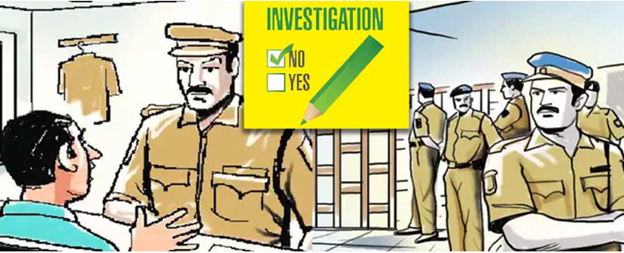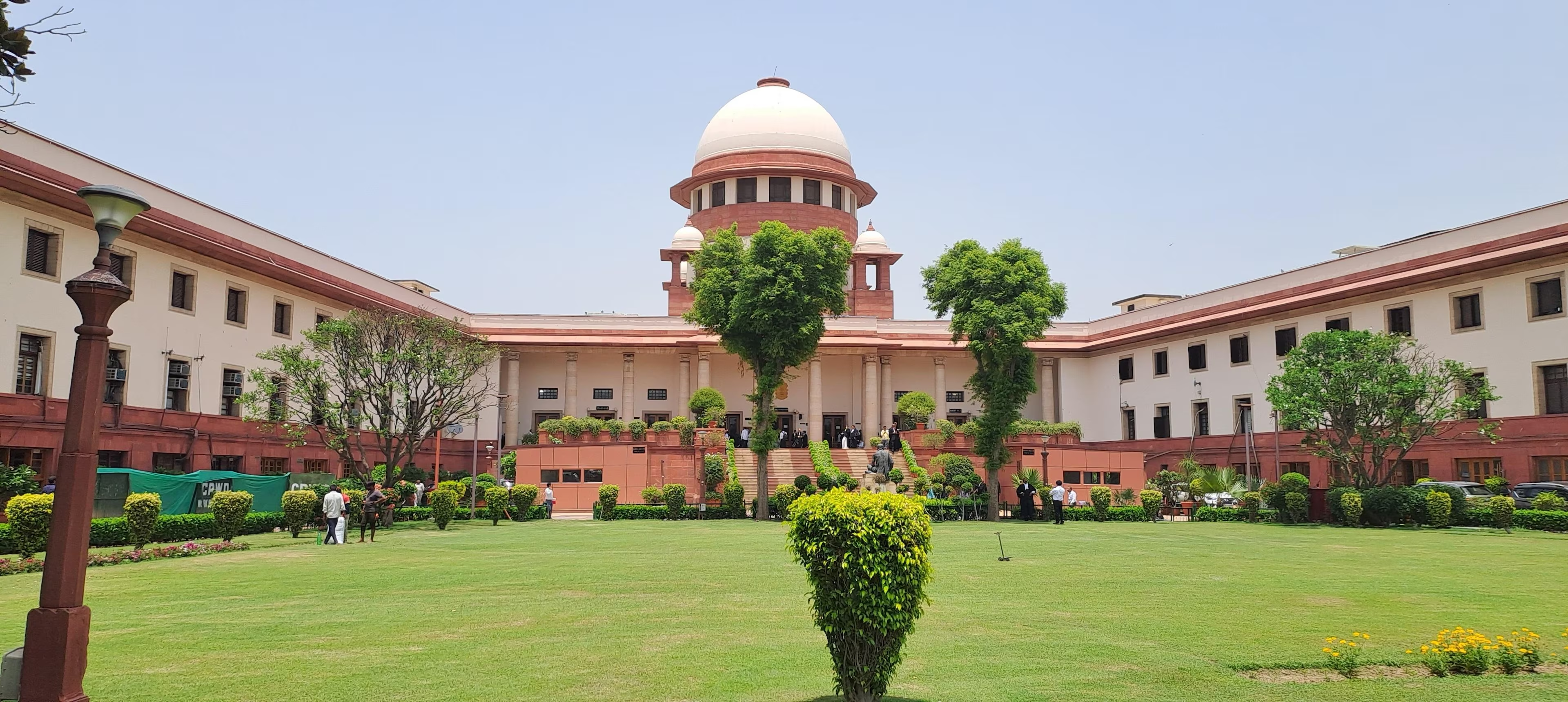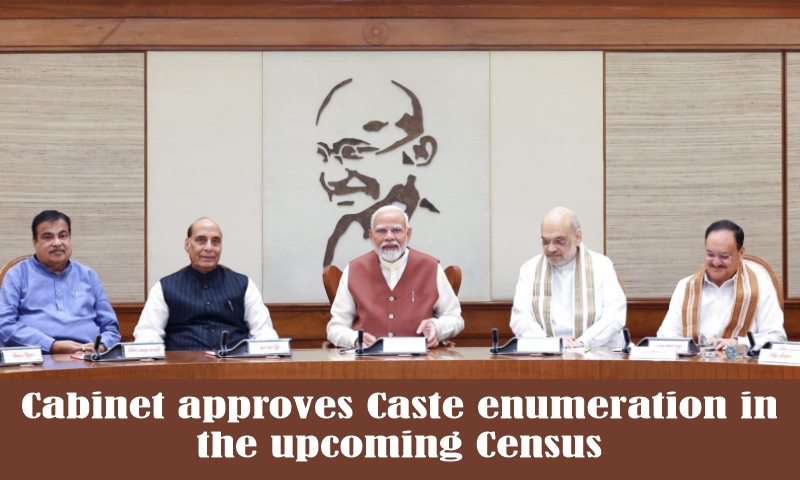- Courses
- GS Full Course 1 Year
- GS Full Course 2 Year
- GS Full Course 3 Year
- GS Full Course Till Selection
- CSAT
- 5 LAYERED ARJUNA Mentorship
- Public Administration Optional
- Online Program
- GS Recorded Course
- NCERT (Recorded 500+ Hours)
- Polity Recorded Course
- Geography Recorded Course
- Economy Recorded Course
- AMAC Recorded Course
- Modern India, Post Independence & World History
- Environment Recoded Course
- Governance Recoded Course
- Science & Tech. Recoded Course
- International Relations and Internal Security Recorded Course
- Disaster Management Module Course
- Ethics Recoded Course
- Essay Recoded Course
- Current Affairs Recoded Course
- ABOUT US
- OUR TOPPERS
- TEST SERIES
- FREE STUDY MATERIAL
- VIDEOS
- CONTACT US
Reliable Code of Police Investigation
Reliable Code of Police Investigation
13-10-2023

Why in News?
In a recent ruling, the Supreme Court has emphasized the need for a consistent and reliable code of investigation to prevent legal loopholes and prevent acquittals.
- Observations came after the court acquitted three accused in a 2013 kidnap and murder case due to police investigation flaws.
SC's Observations Regarding Police Investigations in India
- The court emphasized the 2003 report by Justice V.S. Malimath Committee on Reforms of the Criminal Justice System, emphasizing the importance of thorough truth search and admissible evidence collection.
- The court also cited Law Commission of India 2012 report stating that low conviction rates in India are due to ineffective, unscientific police investigations and inadequate coordination between police and prosecution.
Why SC highlighted Need for Consistent and Dependable Code of Police Investigation in India?
- Lapses in police probes: The Supreme Court has highlighted the need to prevent police probes from lapses that result in technical acquittals of the guilty.
- Investigation and evidence collection: The Law Commission of India has emphasized the need to enhance the standards of investigation and evidence collection, which are often inefficient and unscientific.
- Credibility and legitimacy: To improve the credibility and legitimacy of the criminal justice system, which is frequently criticized for corruption, political interference, and human rights violations.
- Successful prosecution: To ensure the successful prosecution of offenders, particularly in cases involving serious crimes like murder, rape, and terrorism.
- Rights and interests of the victims: The purpose is to safeguard the rights and interests of victims, witnesses, and accused individuals who frequently encounter harassment, intimidation, and coercion during the investigation process.
- More issues:
-
- Pendency of Cases
- Lack of Resources and Infrastructure
- Human Rights Violations
- Public Perception
-
Steps Taken by the Government
- Recently the Govt. has introduced three new Bills in the Lok Sabha that propose a complete overhaul of the country’s criminal justice system
-
- The Bharatiya Nyay Sanhita Bill, 2023, which will replace the IPC, 1860
- The Bhartiya Nagrik Suraksha Sanhita Bill, 2023, which will replace the CrPC, 1898
- The Bharatiya Sakshya Bill, 2023, which will replace the Evidence Act, 1872
-
- Gram Nyayalayas and Lok Adalats were established to provide citizens with access to justice at their doorsteps.
- The Legal Service Authority Act was enacted by Parliament to ensure the provision of free and competent legal services to the less fortunate members of society.
- The government has approved the implementation of a comprehensive scheme aimed at modernizing police forces through the efficient use of technology.
- Government is in the process to draft a new Memorandum of Procedure (MoP) for the appointment of High Court and Supreme Court Judges.
Recommendations to Reform the Criminal Justice System of India
- Malimath Committee, 2003:
-
- The introduction of 'social welfare offences' is introducing a new category of minor violations that can be addressed through fines or community service.
- The adversarial system is being replaced with a mixed system that incorporates elements of the inquisitorial system, allowing judges to actively collect evidence and examine witnesses.
- The standard of proof for conviction has been reduced from 'beyond reasonable doubt' to 'clear and convincing evidence'.
- Confessions made before a senior police officer are admissible as evidence.
- The recommendation was for the establishment of National and State Security Commissions to enhance the quality of investigations.
-
- Madhav Menon Committee, 2007:
-
- The goal is to uphold human dignity and rights at every stage of criminal justice.
- Promoting restorative justice aims to heal the harm caused by crime, rather than imposing punishment.
- The goal is to enhance the coordination and cooperation among various criminal justice agencies, including the police, judiciary, and prosecution.
-
- Vohra Committee, 1993:
-
- The recommendation is for an institution to effectively address this threat by gathering intelligence from various sources and taking appropriate action against such elements.
-
- Supreme Court Directives on Police Reforms, 2006: The Supreme Court issued seven directives to ensure police force's functional autonomy, accountability, and professionalism in response to public interest litigation by former officers Prakash Singh and N.K. Singh.
Some of the directives were:
-
-
- Establishing a State Security Commission to establish policies for police functioning, evaluate performance, and prevent unwarranted government influence or pressure on the police.
- The Director General of Police should be appointed through an objective selection process, not influenced by political executive decisions.
- The police are separating their investigation and law and order functions to expedite investigations, enhance expertise, and foster better rapport with the public.
- The proposed legislation aims to establish a Police Complaints Authority at state and district levels to investigate allegations of serious misconduct and abuse of power by police personnel.
-
Conclusion
It is a good idea to revisit the committee recommendations to create a Code of Police Investigation with a view to reform entire Criminal Justice system. However, it should be done with care, provisions like reducing proof standards and considering confessions as evidence for senior police must be taken up for debate and re-evaluation. In this pursuit NITI Ayog,s recommendations for overhaul of Criminal Justice must be considered in letter and spirit.



